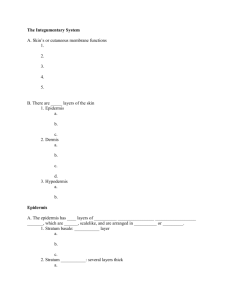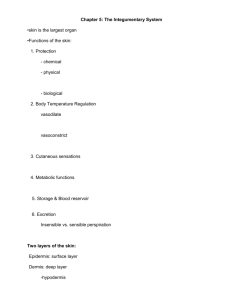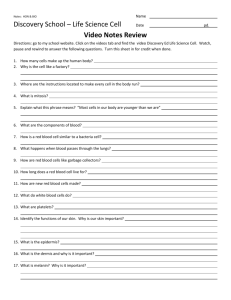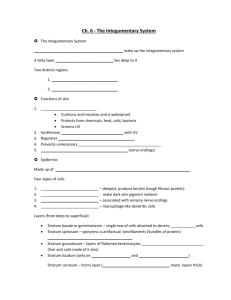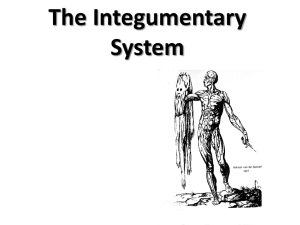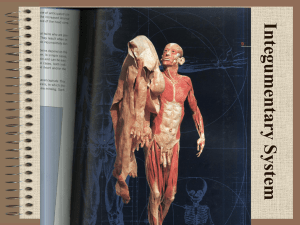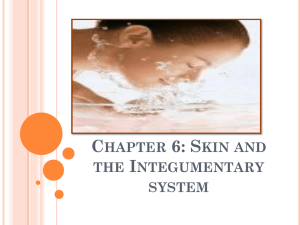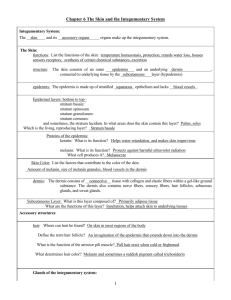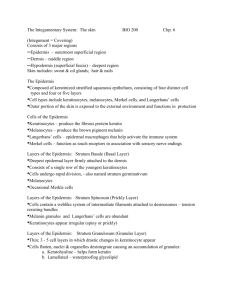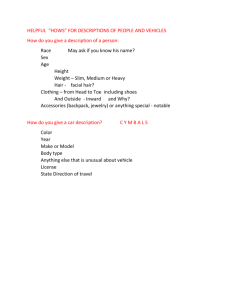UNIT 5 notes
advertisement
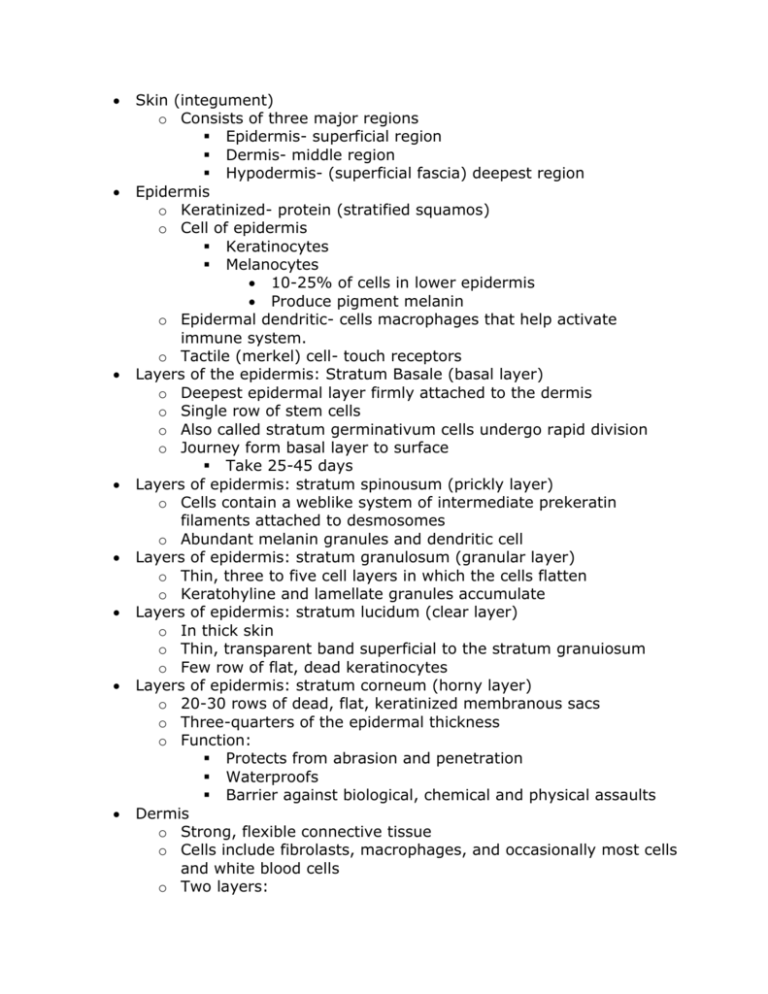
Skin (integument) o Consists of three major regions Epidermis- superficial region Dermis- middle region Hypodermis- (superficial fascia) deepest region Epidermis o Keratinized- protein (stratified squamos) o Cell of epidermis Keratinocytes Melanocytes 10-25% of cells in lower epidermis Produce pigment melanin o Epidermal dendritic- cells macrophages that help activate immune system. o Tactile (merkel) cell- touch receptors Layers of the epidermis: Stratum Basale (basal layer) o Deepest epidermal layer firmly attached to the dermis o Single row of stem cells o Also called stratum germinativum cells undergo rapid division o Journey form basal layer to surface Take 25-45 days Layers of epidermis: stratum spinousum (prickly layer) o Cells contain a weblike system of intermediate prekeratin filaments attached to desmosomes o Abundant melanin granules and dendritic cell Layers of epidermis: stratum granulosum (granular layer) o Thin, three to five cell layers in which the cells flatten o Keratohyline and lamellate granules accumulate Layers of epidermis: stratum lucidum (clear layer) o In thick skin o Thin, transparent band superficial to the stratum granuiosum o Few row of flat, dead keratinocytes Layers of epidermis: stratum corneum (horny layer) o 20-30 rows of dead, flat, keratinized membranous sacs o Three-quarters of the epidermal thickness o Function: Protects from abrasion and penetration Waterproofs Barrier against biological, chemical and physical assaults Dermis o Strong, flexible connective tissue o Cells include fibrolasts, macrophages, and occasionally most cells and white blood cells o Two layers: Papillary Recticular Layers of Dermis: Papillary o Papillar layer Areolar connective tissue with collagen and elastic fibers and blood vessels o Cermal papillae contain: Capillary loops Meissner’s corpuscles Free nerve endings Layers of Dermis: Reticular o Reticular layer 80% of the thickness of dermis Collagen fibers provide strength and resiliency Elastic fibers provide stretch- recoil properties Skin Marketing: Friction ridges o Epidermal ridges lies atop deeper dermal papillary ridges to form friction fridges of finger prints Skin Marking: Cleavage lines o Collagen fibers arranged in bundles form cleavage (tensions) lines o Incisions made parallel to cleavage lines heal more readily Skin color o Three pigments contribute to skin color: Melanin Yellow to redish- brown black Freckles and melanin mole Produce in melanocytes- keratinocyte “pigment shields” Accumulation of melanin Carotene Yellow to orange; palms and soles Hemoglobin Pinkish hue of cell Appendages of the skin o Derivatives of the epidermis Sweat gland Oil glands Hairs and hair follicles Nails o Sweat Gland o Aprocrine and eccrine Eccrine- palms, soles, and forehead o 99% water, NaCl, VC, antibiotic o Ducts connect to pores o Function in thermo regulation Aprocrine- avilary and anogenital area o Sebum- sweat and fatty substances and proteins o Ducts connect to hair follicles o Functional from puberty on wad Specialized procrine o Ceruminous gland- external ear canal secrete cerement o Mammary glands Sebaceous (oil) gland o Widely distributed o Most develop from hair follicles o Become active at puberty Sebum o Oily holocrine secretion o Bacterial o Softens hair and skin Hair o Functions: Alertin the body to presence of insects on the skin Guarding the scalp against physical trauma, heat loss, and sunlight Distribution o Entire surface except palms, soles, lips, nipples, and portion of external genitalia o Consists of head keratinized cells o Contains hard keratin, more durable than soft keratin of skin o Hair pigments: melanin (yellow, rust brown, black, gray) Gray/white hair: decreased melanin production, increased air bubbles in shaft Hair follicles o Extends from the epidermal surface into dermis o Two-layered wall: outer connective tissue root sheath o Hair bulb: expended Hair follicle receptor (root hair plexus) o Sensory nerve ending o Stimulate by bending hair Arrector pili o Smooth muscle attach o “goosebumps” Types of hair o Vellus- pale, fine body hair of children and adult females o Terminal- coarse, long hair of eyebrows, scalp, axillaries, and pubic regions (and face and neck of males) Hair growth o Growth phase (weeks to years) followed by regressive stage and resting phase (1-3month) o Growth phase varies (6-10 years in scalp, 3-4 months in eyebrows) Hair thinning and baldness o Genetically determined and sex influenced condition o Male pattern baldness is caused by follicular response to DHT Structure of nails o Scale like modification of the epidermis on the distal dorsal surface of fingers and toes (DHT testrosome) Integumary system: o Protection- 3 types barrier Chemical: Low pH (acid mantle) and releasing defensins retard bacterial activity Physical/Mechanical Keratin and glycolipids brock most water and watersoluble substances Limited penetration of skin by lipid-soluble substances, plant oleoresins (poison ivy) Biological Dendritic cells, macrophages, and DNA o Body temperature regulation 500 ml/day of routine insensible perspiration (at normal body temperature) At elevated temperature, dilation of dermal vessels and increased sweat gland o Cutaneous sensation Temp, touch, pain o Metabolic functions Synthesis of vitamin D precursor and collagen o Blood reservoir- up to 5% of body’s blood volume o Excretion- nitrogenous wastes and salt in sweat Skin cancer: o Most skin tumors are benign (do not metastasize) o Risk factor Over exposure to UV radiation Irritation to skin o Some skin lotions contain enzymes in liposome’s that con fix damaged DNA o Three major types: Basal cell carcinoma Least (most common) Surgical excision- successful 99% Squamos cell carcinoma Second most common High success rate Kerintinocytes Radian therapy Melonoma Most dangerous Treat by wide surgical excision by immunotherapy Melanocyte Resistant to chemotherapy
